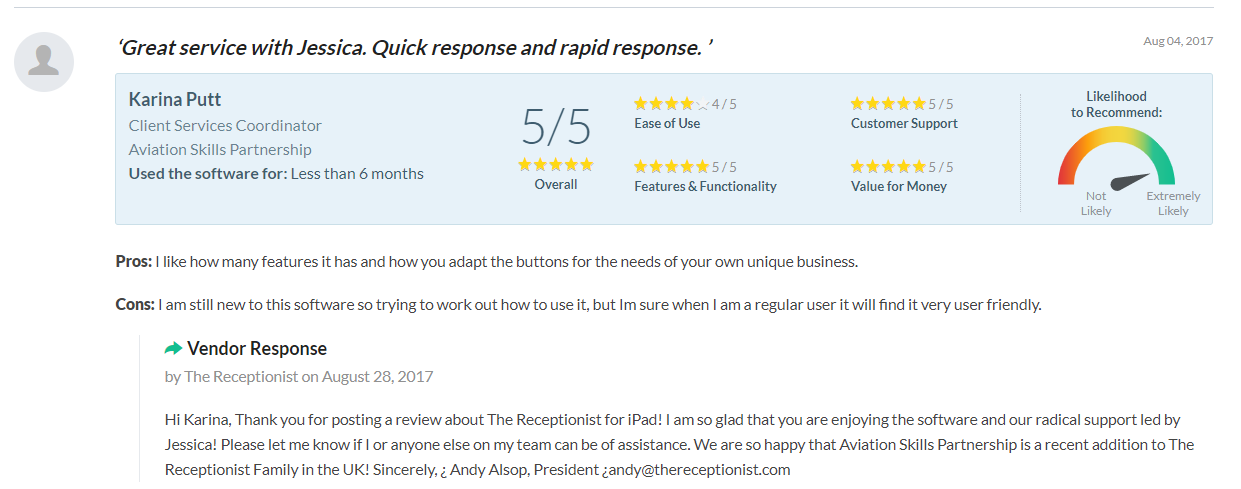Many companies are happy to pay lip service to the idea of being customer-centric.
It makes sense: Companies exist to fill customer needs. If you don’t focus on those needs, your business will struggle.
That’s why most companies are smart enough to employ a dedicated support staff. Some even give that support staff great training and special incentives.
But a truly customer-centric company doesn’t stop there. Instead, it encourages everyone in the company to help customers directly—starting personally with the CEO.
At The Receptionist, we’ve found that direct conversations with customers yield valuable insights that we couldn’t get any other way.
That’s just as true for the CEO as it is for anyone else—maybe even more so.
Establishing Company Culture
Many CEOs see culture building as something outside their main responsibility. They try to delegate that kind of thing to HR, preferring to focus on finances and operations goals instead, says Kotter International in this Forbes column.
However, the responsibility for implementing company values and culture does rest with a business’ top leadership. The leader’s’ behavior dictates what’s acceptable and what is expected throughout the company.
This Harvard Business Review article by Jim Whitehurst (the president and CEO of Red Hat), does a great job summing up this point:
“If you are interested in changing the culture of your organization, your first step should be to look in the mirror and make sure you are setting the kind of behavioral example you want everyone else to follow.”
So, a CEO who wants empathy and listening to be valued throughout the company needs to exhibit those things himself. A CEO who expects employees to prioritize customer success and take personal accountability for it needs to do it, too.
What better way to show that you prioritize customer experience than to occasionally jump in to serve customers personally?
Making Support a Company-Wide Priority
Maybe your leaders are ready to hop in and help with customer support. Or perhaps, as a leader yourself, you’ve already had a direct line of communication open with your customers.
That alone won’t get your company a reputation for radical customer support. You need to get buy in from the rest of your employees.
Part of that is keeping a customer-focused culture in mind when building your team (when hiring, for example, take a note from Tony Hsieh and prioritize cultural fit over all else, even job performance).
If you want your employees to take personal accountability for customer success, they should see you doing it first. Click To TweetIt should be made clear that this customer-first mentality applies to everyone on staff—even in departments that don’t traditionally deal with customers. At The Receptionist, it’s common for engineers to get on the phone with a customer and help with a technical issue.
However, somewhat counterintuitively, the most important people to make sure are truly invested in improving customer experience might just be your support staff.
A study cited in this Harvard Business Review article found that for a company to successfully become customer-focused, the support staff had to be given a real interest in the customer’s experience, too. From the study’s authors:
“Customer-focused companies consistently embrace three concepts. First, they know they can become customer focused only if they learn everything there is to learn about their customers at the most granular level, creating a comprehensive picture of each customer’s needs—past, present, and future. Second, they know that this picture is useless if employees can’t or won’t share what they learn about customers, either because it’s inconvenient or because it doesn’t serve their interests. Finally, they use this insight to guide not only their product and service decisions but their basic strategy and organizational structure as well.”
Does your support staff truly have the needs of your customer at heart, or is their main focus on trying to meet quotas or cut down call times? It might be worth realigning their goals to make sure you all have the same definition of success.
“At The Receptionist, all of our teams know that they can spend as long as it takes to solve a customer issue,” noted Jessica Marshall, Director of Customer Experience at The Receptionist. “The feature requests gleaned from those interactions and the customer experience delivered have been institutionally granted a higher priority than other projects; that gives our teams the freedom to resolve customer questions primarily without the anxiety or fear of consequences from getting behind on other projects.”
Reports Aren’t Enough
You might be thinking to yourself, “I know that we have a passionate, invested support staff and a sophisticated help desk tool. Our CEO reviews the data regularly. Is it still worth it for her to get personally involved in support requests?”

We agree that help desk programs (Helpscout, Intercom, Groove, etc.) are super helpful. In fact, they can do such a good job of helping your staff track, triage, and report on support requests that it’s easy to get lured into a false sense of security that you have a foolproof understanding of all your customers’ pain points.
Sometimes the numbers can really tell you a lot, and they’re much better than not using an automated help desk tool.
But without the connection and emotion that accompany a personal interaction, something important gets lost.
Personally handling support requests allows employees to ask questions that get to the core of what the customer really wants, now and in the future—insights that are particularly helpful to company leadership.
Just a few other benefits of customer support work for employees and leaders alike:
- It adds personal accountability to solve customers’ concerns
- It’s an exercise in the valuable skills of empathy and listening
- It encourages humility
The Effects of Radical Support®
Along with building a great team, customer service has been one of the biggest factors in The Receptionist’s remarkable growth—our original client base grew by 4x in just 15 months.
“As a team, we’ve been focused on providing extraordinary customer service since Day 1,” explained Andy Alsop, The Receptionist’s President and CEO. “In fact, one of my favorite things is when I get to interact directly with customers both large and small to provide them with a solution to whatever problem they are experiencing. It’s been my philosophy that its everyone’s responsibility in the organization to provide customers with a consistently delightful experience. That means that it doesn’t matter whether you are the CEO, the Director of Engineering or in our Shipping Department — your job is always to provide a great experience for our customers.
“Jessica Marshall, our Director of Customer Experience, asked me one day ‘How do you feel about branding our commitment to customer service with the term “Radical Support®?”‘ I loved it the minute Jessica said those two words. With just two words, we could communicate how important great customer service is to our customers and new members of The Receptionist team.”
In practice, this means customers know that they can get a hold of us quickly using the popular chat feature available on our website, and they know that we’ll get back to them quickly when they contact us. That makes a difference. It’s a big part of why they choose our program over the alternatives.
They also feel personally connected to our individual team members, including Andy, our company president. Here are a few ways he interacts with customers:
- He responds to social media interactions personally
- He responds to online reviews personally and with his personal email address
- He follows up on support requests made publicly

Just one example of the company president responding to a happy customer review
Other effects of our emphasis on Radical Support® have been a lot of great online reviews that emphasize the customer support. Many mention our support manager, Jessica, by name. We think that’s a sign that they know they’re working with someone who has their best interests at heart.
In today’s business landscape, especially in SaaS startups like ours, there’s a lot of emphasis on leaders maximizing productivity by outsourcing everything they can. Diving into customer support can seem like a distracting chore, but we hope you’ll agree by now that it’s actually an integral practice.
If you’re a business leader, are you already helping out with customer service? Do you plan to start? Tweet us at @receptionistapp and let us know—and good luck.
Share this Post
